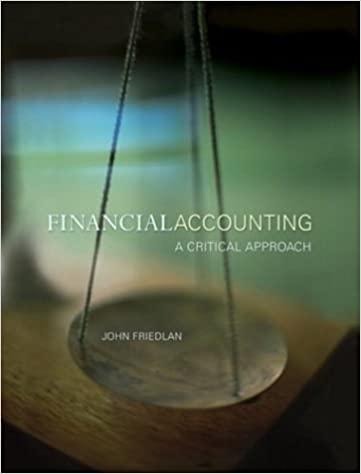Question
Flint Machinery Co. manufactures equipment to a very high standard of quality; however, it must still provide a warranty for each unit sold, and there
Flint Machinery Co. manufactures equipment to a very high standard of quality; however, it must still provide a warranty for each unit sold, and there are instances where the machines do require repair after they have been put into use. Flint started in business in 2020, and as the controller, you are trying to determine whether to use the assurance-type or service-type warranty approach to measure the warranty obligation. You would like to show the company president how this choice would affect the financial statements for 2020, and advise him of the better choice, keeping in mind that the service-type approach is consistent with IFRS, and that there are plans to take Flint public in a few years. You have determined that sales on account for the year were 1,080 units, with a selling price of $3,200 each. Ignore any cost of goods sold. The warranty is for two years, and the estimated warranty cost averages $180 per machine. Actual costs of servicing warranties for the year were $97,200. You have done some research and determined that if the service-type approach were to be used, the portion of revenue allocated to the warranty portion of the sale would be $360. Because the costs of servicing warranties are not incurred evenly, warranty revenues are recognized based on the proportion of costs incurred out of the total estimated costs.
For the assurance-type approach, prepare the necessary journal entries to record all of the transactions described. Payments for completed warranty repairs are paid in cash. (Credit account titles are automatically indented when the amount is entered. Do not indent manually. If no entry is required, select "No Entry" for the account titles and enter 0 for the amounts.)
| Account Titles and Explanation | Debit | Credit |
| Accounts ReceivableWarranty RevenueWarranty ExpenseNo EntryWarranty LiabilityMaterials, Cash, PayablesSales RevenueUnearned RevenueCash | ||
| Warranty LiabilitySales RevenueWarranty RevenueWarranty ExpenseUnearned RevenueMaterials, Cash, PayablesAccounts ReceivableNo EntryCash | ||
| (To record sales on account) | ||
| Accounts ReceivableNo EntryWarranty RevenueMaterials, Cash, PayablesWarranty LiabilityUnearned RevenueWarranty ExpenseSales RevenueCash | ||
| Accounts ReceivableWarranty ExpenseUnearned RevenueNo EntryWarranty LiabilityMaterials, Cash, PayablesSales RevenueCashWarranty Revenue | ||
| (To record payment of warranty expense) | ||
| Warranty LiabilityAccounts ReceivableMaterials, Cash, PayablesUnearned RevenueCashWarranty ExpenseSales RevenueNo EntryWarranty Revenue | ||
| CashWarranty LiabilitySales RevenueMaterials, Cash, PayablesWarranty ExpenseAccounts ReceivableWarranty RevenueNo EntryUnearned Revenue | ||
| (To accrue warranty expense) |
Determine the warranty liability and expense amounts on the financial statements at the end of 2020.
| Warranty Liability | $ | |
| Warranty Expense | $ |
For the service-type approach, prepare the necessary journal entries to record all of the transactions described. (Credit account titles are automatically indented when the amount is entered. Do not indent manually. If no entry is required, select "No Entry" for the account titles and enter 0 for the amounts.)
| Account Titles and Explanation | Debit | Credit |
| Warranty ExpenseUnearned RevenueWarranty RevenueCashMaterials, Cash, PayablesSales RevenueWarranty LiabilityAccounts ReceivableNo Entry | ||
| CashAccounts ReceivableNo EntryMaterials, Cash, PayablesWarranty LiabilitySales RevenueWarranty ExpenseUnearned RevenueWarranty Revenue | ||
| No EntrySales RevenueWarranty RevenueWarranty ExpenseMaterials, Cash, PayablesWarranty LiabilityUnearned RevenueAccounts ReceivableCash | ||
| (To record the sale) | ||
| Materials, Cash, PayablesUnearned RevenueSales RevenueWarranty LiabilityWarranty ExpenseCashAccounts ReceivableNo EntryWarranty Revenue | ||
| No EntryWarranty ExpenseAccounts ReceivableWarranty LiabilitySales RevenueMaterials, Cash, PayablesCashUnearned RevenueWarranty Revenue | ||
| (To record warranty cost incurred) | ||
| Warranty RevenueWarranty LiabilityAccounts ReceivableCashMaterials, Cash, PayablesWarranty ExpenseSales RevenueNo EntryUnearned Revenue | ||
| Warranty LiabilityCashUnearned RevenueWarranty ExpenseAccounts ReceivableMaterials, Cash, PayablesSales RevenueNo EntryWarranty Revenue | ||
| (To remeasure the unearned revenue account) |
Determine the unearned revenue and expense amounts on the financial statements at the end of 2020.
| Unearned Revenue | $ | |
| Warranty Expense | $ |
Step by Step Solution
There are 3 Steps involved in it
Step: 1

Get Instant Access to Expert-Tailored Solutions
See step-by-step solutions with expert insights and AI powered tools for academic success
Step: 2

Step: 3

Ace Your Homework with AI
Get the answers you need in no time with our AI-driven, step-by-step assistance
Get Started


